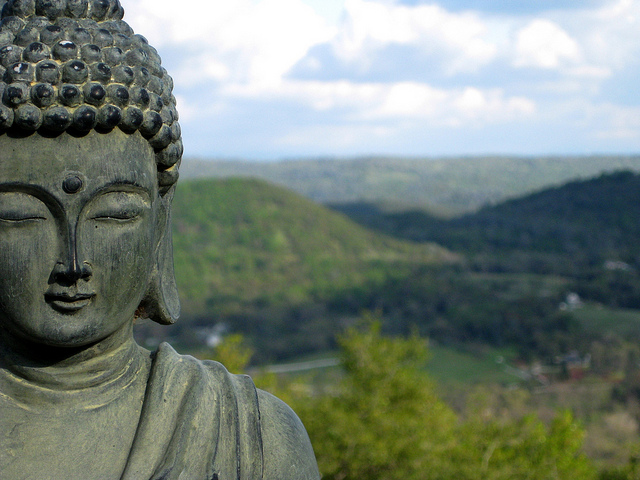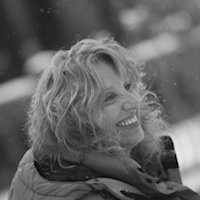
I gaze out of my jail cell. It’s dark, and I’m desperate and afraid. I don’t know who I am—am I the prisoner or the jailer? Or am I both?
Come with me to a new place.
This is a place of great safety, where “Today I might die” doesn’t matter. In that place, the executioner is loved as much as the hanged man. Tumors that break bones don’t matter and neither do needle tracks, promiscuity, despair, regret or betrayal.
A Christian hymn says, “We are pilgrims on a journey.”
The Sufi poet Rumi says, “O you who’ve gone on pilgrimage—where are you, where, oh where?”
The Indian poet Rabindranath Tagore says, “I’m a traveler, a pilgrim. No one can hold or stop me, not the bonds of joys and sorrows, not the room I live in.”
If you want, we can sing as we walk. There’s a long road ahead still, but I know this path is mine, and it is right for me.
Maybe you don’t believe in God. That’s all right. Maybe religion leaves you empty. That’s fine too.
Our destination is kindness and caring for all beings. We’re going to walk beyond pain and shame and hatred. The word that you attach to the destination, how you name it, doesn’t matter.
I have wandered a lot. What I know is that there are three major turning points, three forks on this road. All of them help answer the question “Who am I?”
1. I am not my body
This body is a wonderful temporary organism. Sometimes it’s fun, sometimes it wants food or sex and sometimes it laughs out loud at smelling and feeling and sensing life.
When infection touches it, the body gets sick but it can fight almost any germ. After all, it’s been practicing staying healthy since cavemen fought saber-toothed tigers. The body knows how to grow, how to heal and how to stop when it’s time.
Who am I? Am I the joy and health of my body? What if living in the body is torture?
If I have AIDs or cancer, is that who I am? Am I my tumors? No, absolutely not. If I am 95 and slowly fading, is that who I am? Christopher Reeve was more than his body when he looked like superman, and he also was more than his body when he lay paralyzed.
We are part of the whole. Divine intelligence dwells in our bodies, making them sacred tools. We heal from sickness because our bodies are more brilliant that we can imagine. But a body is a temporary tool.
On our pilgrimage, it doesn’t matter if this body gets broken today. When we are quiet enough, when we meditate or pray, eventually we discover silence. The silence is the truth beyond our bodies, the wholeness that needs no body.
Even with cancer, even on a ventilator, even in addiction, even in death, our perfect essence belongs to the wholeness that is eternal.
Imagine your body as an ice cube floating in a sea of all that is, floating on the living water of kindness—and then melt.
2. I am not my story
The cruelest thing our family and friends tell us is, “I know who you are. I remember everything you have done.” They say, “I love you, but let’s admit it. You’ve never been able to do math.” “You just can’t be faithful.” “No man will ever want you.” “You’re not really star quality.”
It’s so common that we don’t even notice it. People pretend they are being honest. But those pronouncements lock us into prison because we accept the lies as truth.
Kindness could be just as honest. “Wow. That was such a great thing to do.” “Why don’t you try again? I bet you’ll get the hang of it.” “I know you’ve got it in you to succeed. Forget the past. It’s over. Look to the future.”
Much worse than the judgments of others is how brutally we judge ourselves. We savage ourselves again and again, and we think it’s good.
After all, we think the story of our life is who we are. We think our past is our identity. If we “succeed,” then we have permission to be proud. If we “fail,” then we must be ashamed.
Think instead of the story of your life as instants of perception that have passed. They were lessons that you have finished. You can let them go.
Your story is like heavy chains that drag you down. Your story keeps your hands busy so you never reach for joy.
Here’s the trick—you’re clutching those chains and nobody wrapped them around you. If they are there, it’s because you agreed to accept them. You said, “Yes, it’s too bad, but that is who I am.” Your own hands are pulling them tight.
You can let go. You can open your fingers and let it all slip away.
You are not your past, you are not your story, and the ones who really love you will help you let go.
But if I am not my story, then who am I? Sometimes people think their story was ugly, their pain was bad, but at least it gave them a special identity.
You can find a better identity, you are more than just your body and more than just your story.
3. I am not my thoughts
Ever since I was a baby, my mind has been creating thoughts. For many years, I assumed that my thoughts were my truest identity.
Some were good, and some were nasty. I could tell close friends my deepest thoughts, and I thought that was telling them who I really was.
Many of us use thoughts to whip ourselves. If I feel guilt or shame, I can punish myself again and again. “I shouldn’t have done that.” “He did that to me! How terrible!”
If we have an obsessive edge, we replay the bad scenes thousands of times. We would not do that to someone else, but we do it to ourselves. Even our good thoughts are tricky because we are such brutal judges. We think, “I forgive her, so now I am good.” But that gives immense power to a flimsy thought.
Unconditional love means not judging—and that includes not judging ourselves.
One of the first things meditation teaches is that thoughts are neither good nor bad. They just are. I can let them go.
When I think, “I am good,” I can let that float away as a wisp. When I think, “He’s a bad person,” that can also just float away as a wisp.
When I think, “My body is ugly,” it’s just a wisp, neither good nor bad. When I think, “I should never have taken that last drink,” it can melt away. When I think, “There is no hope,” it’s just another strand of nothing.
Practicing meditation gives me the skill to let my thoughts float away without identifying with them. Without meditation, I don’t know how I would accomplish this.
Even after 30 years of meditation practice, it’s still hard. And it’s hard for everyone—even for the Pope and the Dalai Lama. Our thoughts are so intrusive and so compelling that we think they define us.
But we are much more than our thoughts. We are pilgrims on our way to a new place. Even if our bodies are failing, we are whole. Like ice cubes, we are melting into the whole. We are both temporary and eternal.
Just as an ice cube freezes and melts, we take shape and then melt. Are we just the temporary shape? No, we are the essence out of which the ice cube forms. We are the living water.
So even when we are dying, we are whole. The ice cube melts to water as a form of release.
Even if we have failed terribly in the past, we are whole. Nobody dodges life’s lessons, but once the learning is done, we can open our hands and let the chains go. We are not our story.
Who we are today is the only thing that matters.
Even if our thoughts are clever, brilliant, terrible or sacred, they do not define who we are. They are like smoke on the wind and they melt away because they are nothing. We are holy pilgrims, even when we cannot define God.
We arrive at the sacred place beyond words, beyond time and beyond individuality. We rest in the immensity of all that is. “I will die” and “I was born” don’t matter. In this place, it’s easy to touch one another as our edges have melted.
Who are we?
We are the connection itself. We are pilgrims on a journey to the truth of utter kindness.
Here, take my hand. Look into my eyes.
We melt into each other and become one.
~
~
Love elephant and want to go steady?
Sign up for our (curated) daily and weekly newsletters!
Apprentice Editor: Jessica Sandhu / Editor:
Photo: Flickr






Read 11 comments and reply